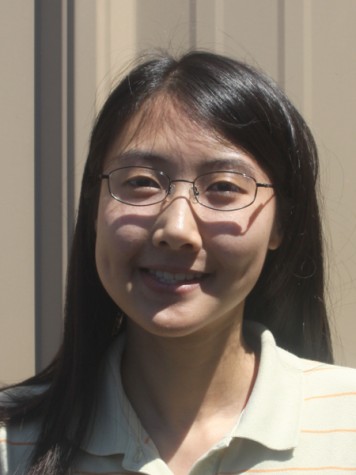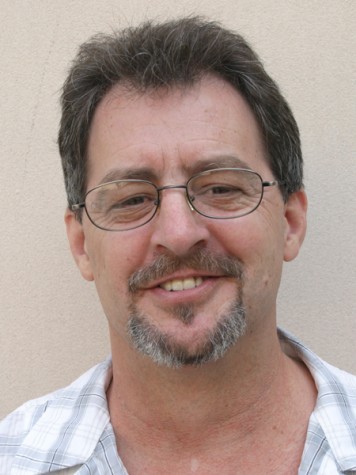Sharis Harootun knows that she cannot change everything in the world. But if she can change a little, then that would mean a lot to her.
As vice president of community service for Alpha Gamma Sigma at Glendale Community College, she finds organizations that the academic honor society could join.
“I’m always researching volunteer opportunities and community service events for our members,” Harootun said. “I think about issues and serious things that are happening around the world and I Google about it to see how I can get myself involved and help out with other people.”
Harootun was searching for new organizations online when the Water Project appeared in the search. She did more research about them and felt that it was important to bring awareness about this issue because many people do not know that other countries lack clean water.
The Water Project is a non-profit organization that builds wells in countries such as Kenya, Sierra Leone, Sudan, Uganda and India. Donors are updated about the building progress and are sent pictures, global positioning coordinates and a community report of the final product.
Depending on the location, it costs an average of $4,500 to $6,500 to build a well, which will last for 10 years. The costs include the construction of the well and long-term monitoring. Donations will also fund the well pumps, drill bits, fuel, crew’s wages and repairing rigs.
The Water Project fundraiser will last until May 28. AGS posted fliers around the GCC campus that listed various ways that GCC can help. Three steps are listed, but it is actually one challenge.
The first is to avoid drinking any type of beverage other than water. The Water Project suggests tap or filtered water as the drink of choice because bottled water is too expensive and wasteful.
The money that would have gone toward purchasing soda, juice, milk or bottled water is then donated to the Water Project.
The Water Project uses the proceeds from the donation to build wells in villages that do not have clean or safe water.
Henan Joof, advisor to AGS and outreach coordinator at GCC, said the AGS cabinet agreed to participate in this worthwhile event after a few brainstorming sessions. At first, the fundraiser was going to be an AGS event for the club, but then Harootun realized that extending the fundraiser to the GCC campus allows students and faculty to become aware of the water issues in other countries.
Out of many organizations available to help, this was the one that drew her attention. Harootun, a business administration major, has been thinking about this concern since the beginning of college and would like to work for a non-profit or open her own non-profit.
“I am really passionate about bringing awareness and about serious issues that are happening around the world,” Harootun said. “Yes, we need to help with the issues here locally, but also around the world because there is a lot happening.
“I feel that as generations go on, we will become more aware of environmental and social issues. Our generation is the start of it. We are going to be more aware of how precious our environment is and how we can’t be so wasteful and so na’ve about consuming.”
According to the Water Project’s website, 1 billion people suffer from not having access to clean drinking water. The website also states that 80 percent of illnesses in developing countries are linked to poor water and sanitation conditions.
“We could go now and pay a dollar for a bottle of water maybe even more,” Harootun said. “It’s so bizarre to me. How can we be so comfortable here while people have to walk miles just to get water. not even clean water?”
Other students also realize the impact of the lack of clean water. Bianca Saleebyan, newsletter editor for AGS, said the importance of fresh water consumption is something that is easily overlooked because it is such an automatic and natural thing.
“In recent weeks, the Los Angeles Times has published several articles about the threat of pollution to the L.A. River, the Pacific Ocean and our freshwater supply,” Saleebyan said. “Just reading those articles and taking into account how much we are taking for granted by polluting our water supply when others don’t have any inspired me to participate in the Water Project.”
Some students will not participate in the challenges listed on the flier. Saleebyan said she does not drink soda, coffee or tea on a regular basis. With some occasional exceptions, she prefers to drink water.
“Since I really do not spend much money on beverages, I feel it would be more beneficial to make a flat $20 or $30 donation rather than participating as the fliers advertise,” Saleebyan said.
Saleebyan said that Harootun and Isaac Pedraza, secretary for AGS, will track the members’ participation in the Water Project.
AGS has set a goal of $200. “I’m not sure exactly how many people are participating or who they are, but I do know we have already achieved over half our target amount in AGS,” Saleebyan said.
“Naturally, it would be wonderful if we go over our projected amount of donations to further serve the organization and help provide water to more people,” Saleebyan said.
Additionally, Harootun said she will ask members for their opinions at the end of the fundraiser.
“To be honest, I’m pretty sure that a lot of people aren’t going to do the challenge,” Harootun said. “But the fact is, they saw [the flier] and they were interested in it.”
Harootun said she set up the entire fundraiser through the Water Project website. “They are a really good organization. You can tell they really want people to raise money.
“The important thing that I tell AGS members is that $10 can give one person clean water for 10 years.”
Students can help with the Water Project in various ways by donating, researching the issue on the website and spreading the word. “This is an individual event for people to do on their own time. This is just something you do for yourself,” Harootun said.
“The greater effect to those participating or who hear about the challenge is education,” Joof said. “We need more people to be aware of the difficulties villagers face in accessing potable water. They will also see how easy it is for them to make a contribution and make a difference.”
Students can donate cash or write checks to the Water Project and send them to the student outreach services office located in the Sierra Madre Building 266.
Although the official deadline for AGS members is April 5, members will accept donations from March 22 until May 28.
Harootun and AGS members have been actively involved in the Glendale community and the Los Angeles area. Last year, they adopted Venice Beach to do beach cleanup because it is considered one of the dirtiest beaches in California.
AGS also volunteers with the Los Angeles Food Bank and the University of Southern California Friends and Neighbors Service Day. They also volunteer with PATH Achieve in Glendale, which is an organization that helps people find a house or a job.
For more information about the Water Project, please visit http://thewaterproject.org/community/profile/sharis-harootun or e-mail Sharis at [email protected].


